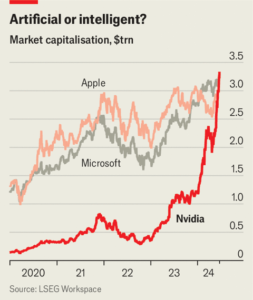
Your browser does not support the <audio> element.
Some corporate tie-ups delight investors. Others make them groan. The purchase of a 41% stake in ITA, Italy’s national airline, by Lufthansa, a German carrier, for €325m ($350m) is an example of the latter. Rumours that the EU is close to blessing the deal have contributed to a slump in Lufthansa’s share price.
ITA, once called Alitalia, is hardly a crown jewel. Since its founding in 1946 it has turned an annual profit only three times. The Italian government privatised the company in 2009—then renationalised it in 2020, rebranding it as ITA in the hope of a fresh start. Air France-KLM and Etihad, two airline businesses that had taken minority stakes in the carrier, wrote off their investments. The Italian government spent around €3.5bn during the covid-19 pandemic to keep the company aloft, equivalent to roughly €300,000 per employee.
Turning around a business with such an impressive history of financial disaster seems like a tall order. The Italian carrier has been pummelled by low-cost rivals, including Ryanair and Wizz Air, that have expanded in Italy to capitalise on the turmoil at the company. “Acquiring ITA is one of the most challenging propositions in European aviation,” says Tobias Fromme of Bernstein, a broker.
Why, then, is Lufthansa pursuing a deal? It argues that Italy is one of the company’s biggest markets, and that ITA’s routes to Africa and South America complement Lufthansa’s routes to North America and East Asia. It adds that it already owns another small Italian airline, Air Dolomiti, which means it is familiar with the market. A further motivation may be Lufthansa’s fear that ITA could fall into the hands of a rival.
European aviation is in the midst of what may be its final wave of consolidation. Six companies—Air France-KLM, EasyJet, IAG, Lufthansa, Ryanair and Wizz Air—already account for 71% of capacity on flights within the continent. IAG, which owns Aer Lingus, British Airways and Iberia, is planning to buy 80% of Air Europa, Spain’s third-biggest airline, subject to EU approval. A large stake in SAS, a Scandinavian carrier, is being sold to Air France-KLM and Castelake, an American private-equity firm. Air France-KLM and IAG are expected to bid for TAP, Portugal’s state-owned airline, which is up for sale. After that there will be little else left to buy. Finnair, of Finland, is unlikely to attract much interest from buyers, owing in part to the country’s proximity to Russia.
All this worries the European Commission, the EU’s executive arm. It is concerned that consolidation will lead to higher fares and less choice for European consumers, which is why it has been probing the ITA and Air Europa deals. A decision on the first of these is expected by July 4th, and on the second by August 20th. Both IAG and Lufthansa have been dangling concessions. IAG has offered to relinquish just over half of Air Europa’s landing slots. Lufthansa has reportedly said it will cede around 40 slots at Linate airport in Milan to EasyJet and Volotea, another low-cost airline. It has proposed to keep a number of ITA’s short-haul flights to Austria, Belgium, Germany and Switzerland that compete with its own flights. And it plans to delay integrating ITA into its transatlantic joint venture with United Airlines, an American carrier, for two years.
Such concessions will only make the ITA deal worse for Lufthansa’s investors. The German carrier looks to be buying itself a giant headache. Although ANPAC, the Italian pilots’ union, is supportive of the deal, it is notoriously difficult to work with. What is more, Italy’s government will remain the largest investor in the Italian carrier after the deal, at least initially. Lufthansa will have the option to buy the rest of the company at a later date. Its investors may pray it doesn’t. ■
To stay on top of the biggest stories in business and technology, sign up to the Bottom Line, our weekly subscriber-only newsletter.















